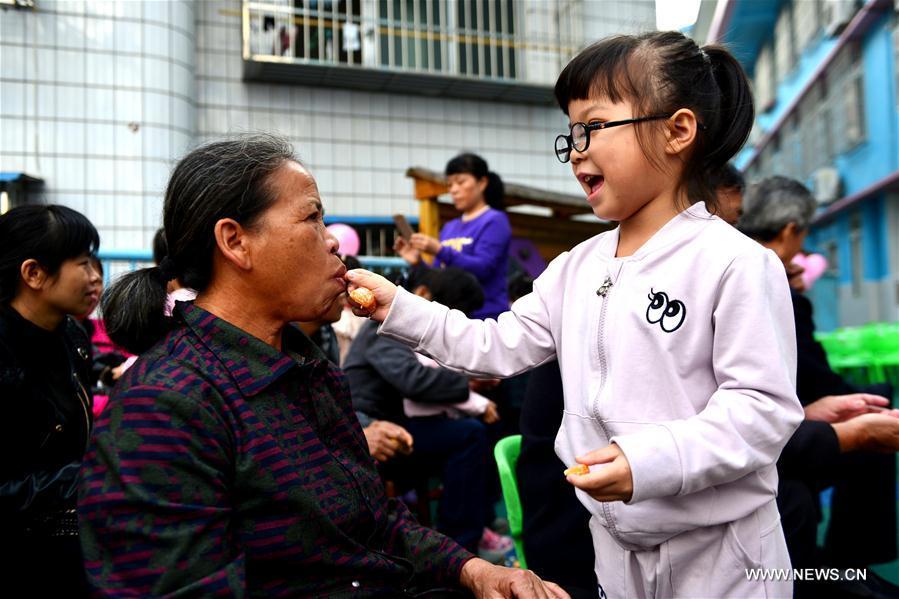Filial piety revalued as China becomes a graying society
- By Wu Jin
 0 Comment(s)
0 Comment(s) Print
Print E-mail China.org.cn, October 28, 2017
E-mail China.org.cn, October 28, 2017
With the Double Ninth Festival, a day for paying tribute to the elderly in China, is about to be celebrated (Oct. 28), the well-being of the growing number of aging population is arousing concern over the multiple challenges caused by a graying society.
 |
|
A child feeds orange to an elder at a kindergarten in Guilin, south China's Guangxi Zhuang Autonomous Region, Oct. 27, 2017. An activity was held here to greet the approaching Chongyang Festival. The Chongyang Festival falls on the ninth day of the ninth lunar month and is a day to pay respect to seniors. [Photo/Xinhua] |
People from single-child families are empowered by freshly enacted local laws to take 10 to 20 days off from their duties to encourage them to return home, reunite with their parents and take care of them.
Based on this local legislation, those who accept the offer can still enjoy full wages while taking leave to care of the elderly at home.
Six provinces and regions, including, Henan, Fujian and Guangxi Zhuang Autonomous Region, have spearheaded the move, highlighting the value of filial piety at a time when society is aging fast.
The merits of filial piety have a long history in China as stories of considerate, dedicated, if not sacrificing, sons and daughters have never lost their appeal in being passed down from one generation to another.
The annual Double Ninth Festivalwell exemplifies the homage that Chinese civilization pays to the elderly.
However, in the modern era, the separation of families with the huge migration of young people from villages, towns and third-or-fourth-tier cities to metropolises have led to severe loneliness and even helplessness of the parents left behind in an "empty nest."
The problem is even stressful in the single-child families that have become the norm in recent decades.
A couple, both growing up in single-child families, potentially have four old people to nurse even before their retirement, not to mention having to care for their own children and even grandchildren.
However, their incomes may not be able to cover the skyrocketing costs of housekeepers, nannies or babysitters, who are becoming increasingly insufficient as the nation rushes headlong into a graying society, according to Ning Xiangdong, professor from the School of Economics and Management, Tsinghua University.
Based on data from national censuses in the past two years, China is rapidly approachinga "hyper-aged society", a term coined by the World Health Organization for countries with 20 percent of the population aged above 65.
According to the UN's latest forecast, people above the age of 60 will make up more than 30 percent of the entire population in China in 2050.
According to Professor Ning, in 20 years, the potentially senile population in China will hit 300 million, indicating couples who reach their late 50s at that time will spend substantial time on nursing both their parental and offspring's families perhaps for a period of 20 years.
However, the impending challenge differentiating China from the developed world is that the country's graying society may take shape without waiting for the majority of the elderly to become moderately affluent.
Chen Jinsong, deputy professor from the School of Sociology and Population Studies of Renmin University, said, "All of us will get old at one time or another, so the expectations for well-being in old ageare not going to weaken. If we do not solve the problems facing graying society well, it will disturb the sentiment of the entire society.
"Cases like the elderly with their bodies being found several days after their deaths or those being discovered bedridden over a certain number of days seriously contravene the values of a harmonious society."
China is mulling ways to improve its healthcare services, pension system, by which, at present, rural elderly only get about 55 yuan (US$8.43) a month, and nursing house facilities, to tackle problems emerging in an aging society.






Go to Forum >>0 Comment(s)